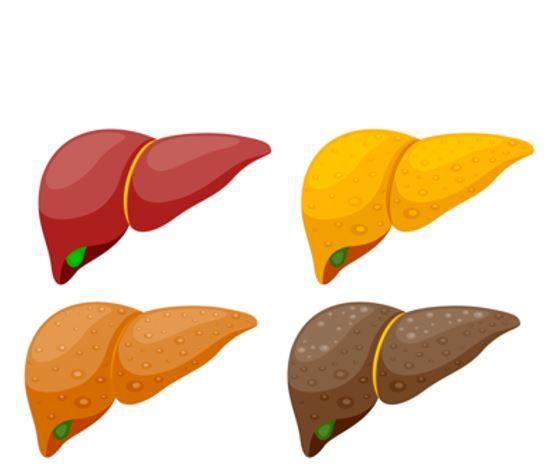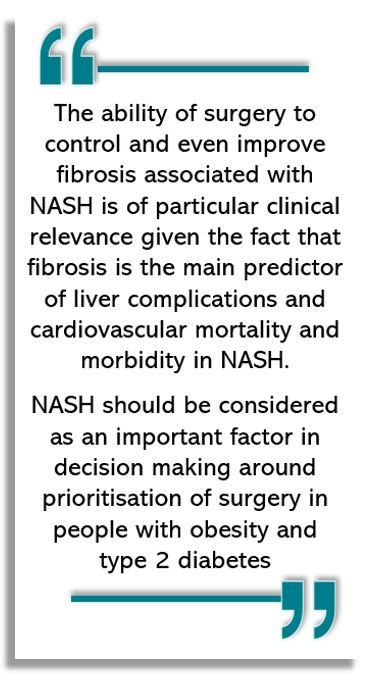- Clinical Technology
- Adult Immunization
- Hepatology
- Pediatric Immunization
- Screening
- Psychiatry
- Allergy
- Women's Health
- Cardiology
- Pediatrics
- Dermatology
- Endocrinology
- Pain Management
- Gastroenterology
- Infectious Disease
- Obesity Medicine
- Rheumatology
- Nephrology
- Neurology
- Pulmonology
Bariatric Surgery Associated with NASH Resolution in Randomized, Open-label Trial
Among patients with biopsy-confirmed nonalcoholic steatohepatitis (NASH), undergoing bariatric-metabolic surgery was associated with a more than 3-fold greater probability of histologic resolution of the disease at 1 year compared with lifestyle modification, report authors of a first-of-its kind study published when in the Lancet.
©wowow/Adobe Stock

The randomized, open-label Bariatric–metabolic surgery versus lifestyle intervention plus best medical care in non-alcoholic steatohepatitis (BRAVES) trial compared the effects of Roux-en-Y gastric bypass (RYGB), sleeve gastrectomy, and lifestyle intervention plus optimized medical therapy and found in the per protocol analysis that 70% of patients who had either of the bariatric procedures had complete reversal of inflammation and hepatic cell damage with no worsening of hepatic fibrosis, a proportion, according to the authors which “far exceeded the effects of any drug tested until now in randomised trials.”
Moreover, the more severe the baseline biopsy-detected NASH and the higher the stage of liver fibrosis, the greater were the proportions of patients with NASH resolution. “Improvement of at least one stage of fibrosis severity without worsening of NASH was almost twice that in the control group,” the authors reported.
"An orphan..."
Calling NASH a condition “long considered an orphan of effective therapies,” lead investigator Geltrude Mingrone, MD, PhD, professor of Medicine at the Catholic University of Rome and professor of Diabetes and Nutrition at King’s College London and colleagues wrote that results of the study “provide a compelling case for prioritisation of metabolic surgery in this population,” either with or without type 2 diabetes (T2D).
Citing data from small and primarily retrospective studies that suggest metabolic surgery might be an ideal approach to NASH resolution, Migrone and colleagues designed the first randomized trial to directly compare the impact of surgical intervention with currently recommended lifestyle changes and best possible pharmacotherapy .
The trial was conducted in 3 major hospitals in Rome, Italy. Eligible participants were required to have obesity (BMI 30–55 kg/m2), with or without T2D, with histologically confirmed NASH and no evidence of another form of liver disease. Histologically confirmed NASH was defined as non-alcoholic fatty liver disease (NAFLD) activity score of at least 1 in each single item.
Mingrone and colleagues randomized participants in a 1:1:1 ratio to lifestyle modification plus best medical care, RYGB, or sleeve gastrectomy.
All patients received lifestyle modification counseling. Those in the intensive lifestyle modification arm were placed on a reduced calorie diet and prompted to gradually increase physical activity. Best medical care included treatment for participants with T2D with pioglitazone and liraglutide or other antihyperglycemic medications as needed.
Investigators defined the primary endpoint as the histologic resolution of NASH without worsening of fibrosis the 1-year follow-up. The secondary endpoint was improvement in liver fibrosis by at least 1 sate of the NASH-CRN fibrosis score with no worsening of NASH.
From April 15, 2019-June 21, 2021, a total of 431 patients underwent biopsy screening of whom 288 comprised the final cohort. Mean age was 47 years, 56% were men, and all participants were White. The 288 participants were randomized in 3 equal groups of 96 to lifestyle modification, RYGB, and sleeve gastrectomy.
FINDINGS
At 52 weeks, results of the intention-to-treat analysis showed that the proportion of patients achieving NASH resolution with no worsening of fibrosis was significantly higher in both the RYGB (56%) and the sleeve gastrectomy group (57%) compared with the lifestyle modification group (16%) (P<.001). Further, the reported calculated probability of NASH resolution was 3.6-fold greater (95% CI, 2.19-5.92; P<.001) in the RYGB group and 3.67-fold greater (95% CI, 2.23-6.02; P<.001) compared with the lifestyle intervention group.

Findings from the per-protocol analysis, which included 82% of participants who underwent randomization, also were highly significant, with NASH resolution observed in 70% of the RYGB group, 70% of the sleeve gastrectomy group, and 19% of the lifestyle modification group (P<.001).
The research team reported that the presence of T2D was the only variable that negatively predicted NASH resolution without fibrosis progression, a finding consistent with evidence for T2D as a key risk factor for NAFLD and for progression of the disease to NASH.
Regarding safety outcomes, the study reports no deaths or life-threatening complications. While 10 participants in the surgical groups experienced a serious adverse event, none required reoperation and issues were resolved with medical or endoscopic management.
“The ability of surgery to control and even improve fibrosis associated with NASH is of particular clinical relevance given the fact that fibrosis is the main predictor of liver complications and cardiovascular mortality and morbidity in NASH,” wrote the authors in conclusion. “These findings further support the use of bariatric-metabolic surgery in people with metabolic diseases. NASH should be considered as an important factor in decision making around prioritisation of surgery in people with obesity and type 2 diabetes.”
Reference: Verrastro O, Panunzi S, Castagneto-Gissey L, et al. Bariatric-metabolic surgery versus lifestyle intervention plus best medical care in non-alcoholic steatohepatitis (BRAVES): a multicentre, open-label, randomised trial. Lancet. 2023;S0140-6736(23)00634-7. doi:10.1016/S0140-6736(23)00634-7
Obesity Linked to Faster Alzheimer Disease Progression in Longitudinal Blood Biomarker Analysis
December 2nd 2025Biomarker trajectories over 5 years in study participants with AD show steeper rises in pTau217, NfL, and amyloid burden among those with obesity, highlighting risk factor relevance.
